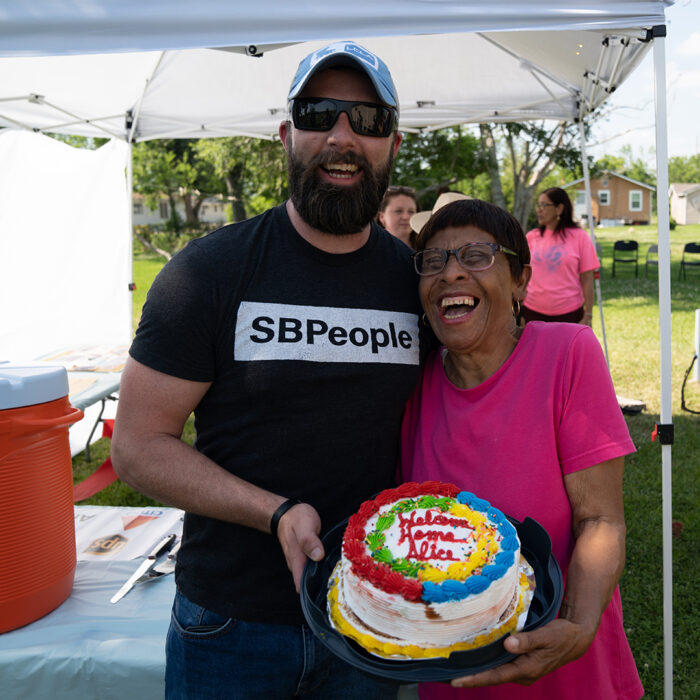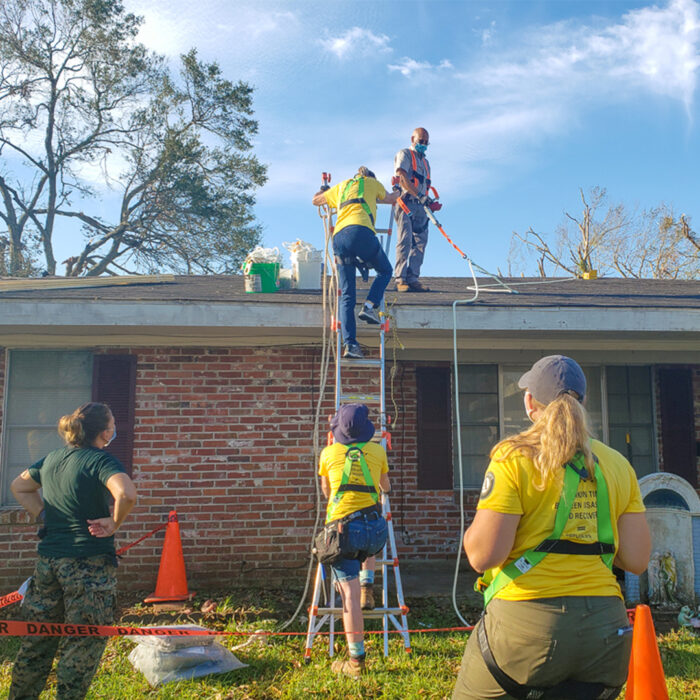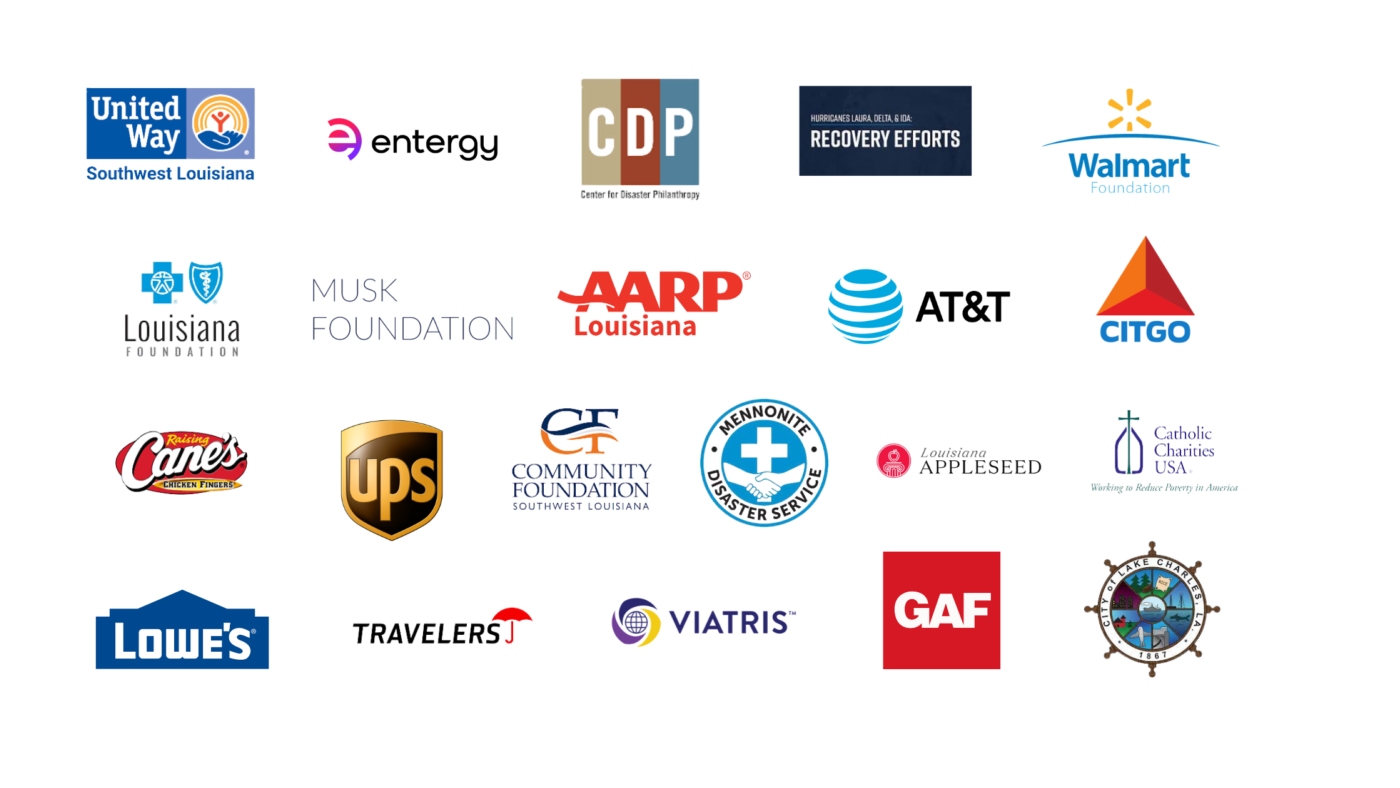In late 2020, two major hurricanes (Laura and Delta) hammered Southwest Louisiana within the space of six weeks, displacing thousands of families and causing over $23 billion in damages to communities already struggling to cope with the impact of the COVID pandemic.
SBP launched an immediate response to the hurricanes, deploying staff to assess the damage and start the vital work of helping communities rebuild and recover. Then, in May, 2021, just seven months after the back-to-back hurricanes, unusually heavy rainfall triggered historic flooding in the region, causing even more damage.
Our long-term programs in Southwest Louisiana expanded to prioritize people who were least protected and hardest hit, including displaced families with small children, the elderly, people living with disabilities, war veterans, and under- and uninsured homeowners.
Since launching our Southwest Louisiana recovery operations in 2020, SBP has:
Rebuilt 201 homes, which preserved at least $9,098,349 in home equity.
Helped 81 disaster survivors file FEMA appeals and secure a total of $285,000 in funding.
Provided resources to SHARE partners (local nonprofits) to help them rebuild homes for 44 more families.
Conducted 14 disaster recovery trainings that assisted 567 people to apply for federal assistance, appeal their FEMA awards, and avoid contractor fraud.
Reached over 502,710 people through digital campaigns to help them mitigate future disaster risks and navigate the recovery process.
With United Way of Southwest Louisiana, hosted a series of FEMA Appeals Clinics which helped 17 homeowners in Southwest Louisiana increase their collective recovery funds by over $185,000.
Established a Disaster Resilience and Recovery Fellows program—with placement of the first SBP Fellow in Lake Charles, which helped the community secure a $40 million HUD Choice Neighborhoods Grant.
Deployed 5 AmeriCorps members in SWLA who contributed a combined effort of 6,744 hours of service.
After three years of hard work and invaluable learning, SBP is concluding its operations in Southwest Louisiana this month–November 2023.
To mark this milestone, John O’Donnell, Executive Director for SBP Southwest Louisiana, shares some final reflections and pays tribute to SBP’s courageous clients, local partners, AmeriCorps volunteers, donors, community leaders, and the SBP team.


Interview with SBP Southwest Louisiana Executive Director, John O’Donnell
Q: You worked in Southwest Louisiana as a leader in your community for years before joining SBP. Why did you choose public service work – and how did you first become involved with SBP?
A: My professional life has been defined by wanting to solve problems, whether they involve public health and disease prevention, disaster recovery, or climate-change mitigation. I want to help solve big problems for people who need assistance the most. People on the front lines of public health issues in America. People on the front lines of climate change. I wanted to be contributing where the needs are greatest and where the “action” is: I still do.
I live in Lake Charles, and I joined SBP because I wanted to be employed in service to my community. Disaster recovery requires an all-hands-on-deck mindset. You’re working to connect aid organizations with each other and build a coalition with the local government to deliver the greatest collective impact. My work with SBP gave me a chance to pursue that–and put resources behind the recovery efforts in my community.
Q: What were SBP’s initial priorities and goals in the region?
A: Our overarching priority was to bear witness to an unprecedented series of natural disasters in Southwest Louisiana. Our job was to generate greater recognition of the unmet needs, shine more light on the urgency of the situation, bring in more resources to help people rebuild and recover, and leverage the situation as a vital learning opportunity to help SBP adapt and improve our programs to better meet the needs of other disaster-affected communities.
This won’t be the last time that SBP responds to back-to-back disasters striking the same community. We know that Mother Nature throws punches in bunches, and we need to be ready. People are counting on us. I see SBP’s experience here in Southwest Louisiana as an important growth opportunity for the organization.
Q: What were the most significant challenges the program faced?
A: SBP launched its programs in Southwest Louisiana not only in the wake of Hurricanes Laura and Delta, but also at the peak of the COVID crisis. The pandemic complicated our work greatly and made it even more difficult.
Another major challenge was that the Southwest Louisiana disasters didn’t get much national attention or media coverage, and we faced resource constraints. In fact, the Hurricane Laura recovery effort in SWLA represents the longest delay in the release of federal Community Development Block Grant funds in US history. It took well over 1.5 years to get any of the federal CDBG funds into communities here. Despite challenges, I am very proud that SBP Southwest Louisiana was able to raise money to fund recovery efforts—and as a result, we stayed here building houses a year longer than planned.
Q: What are you most proud of?
A: I am very proud that SBP built so many houses for disaster survivors in crisis in the Southwest Louisiana region. I’m also very proud that, in many ways, our SWLA program was a training ground–and a proving ground–for some of SBP’s key innovations. This was the context in which we recognized the need for better solutions–and where we piloted and tested new approaches. When people here see the trucks with the SBP yellow light bulb logo pull up–they know who we are, they know us. Continuous improvement is one of SBP’s values. We have to keep investing in it and putting it into practice. That value gives me the most hope that we can do big things in the future.
SWLA is where SBP pioneered our FEMA appeals program, now known as our Disaster Assistance Program. Our DAP team did critical work here to bridge gaps and help the most vulnerable people access appropriate FEMA assistance. Our ADVISE program strengthened the capacity of local government officials to identify, hold down, and spend CDBG funds in a responsible way. SBP's SHARE team was also deployed to empower and strengthen the capacity of local nonprofit partners to help them rebuild and repair homes.
Q: What are the SBP’s Southwest Louisiana program’s most significant achievements, in your view?
A: A huge achievement was the fact that we were able to build homes because we were able to build a coalition of local nonprofit organizations. When resources dried up, we came together and asked each other, “What do we have that you don’t?” We pooled resources together. Our collaboration caused a breaking of silos. We united as a diverse group of impact organizations with different values, working together to make it happen with a shared mission.
Q: What do you most want the world to know about the people SBP served in Southwest Louisiana, based on your experiences there?
A: The people are really, really tough. They have looked the hardest times in the face, lived through them, and are still doing what they do, getting on with it. That hard work is something that makes us unique as a community–the way we go about it. We go through hard times, smile through it, make gumbo, kick our boots up, tough it out, dance it out. That makes us unique–while still sharing the broader values and resilience that define Americans.
I also want the world to know that people in Southwest Louisiana are living on the front line of climate disasters. We’re still very vulnerable. The work here is not done. Remember us. Shine a light on us whenever you can.
Q: Is there an SBP client you met or worked with whose story impacted you most strongly–someone you think you’ll remember years down the line?
A: Miss Alice McCray–I will always remember her. During May 17th, 2021 floods in Lake Charles, 18 inches of rain came down in five hours. No one expected it. I was working search and rescue that day. The nephew of a 70-year-old woman called and told us she needed help and that she was stuck in her home, flooded with three feet of water.
When I got there, she said, “Are you here to get me?” I said, “Yes ma'am, let’s go.” Using the kitchen table top, I floated her out into the floodwaters. She was a kind, sweet lady. I finally got her to the truck. Once she got there, she spent all her time taking care of all the other people waiting in the truck that we had pulled out of their homes that day. She really turned on her grandma, caretaker mode. She was laughing and in good humor. That was a really tough day for me, but she brought a light to it that was much needed. I didn’t know Ms. Alice McCray’s name when I pulled her out of her house. But I followed the address for a start work order to rebuild a house later on – and it took me to her house.
It was really great to get to rebuild Ms. Alice McCray’s house – and put her back in it. I baked her a cake for her welcome home party. That was the first cake I have ever baked, the result of several trial runs the night before. I wanted to get it right for Ms. Alice.
Q: Any special shout-outs or words of thanks to people, partners, donors, staff, or anyone at all you’d like to recognize on behalf of the SBP team in SWLA?
A: I want to say thank you to SBP–and to all the SBP supporters and volunteers–for giving us the resources to help our community.
SBP is profoundly thankful to the following partners for helping us build the way home for disaster survivors in Southwest Louisiana: United Way of Southwest Louisiana, Entergy, Center for Disaster Philanthropy, Care Help, Vinton Hurricane Laura Recovery, Walmart Foundation, Blue Cross Blue Shield of Louisiana Foundation, Musk Foundation, AARP Louisiana Foundation, AT&T, Citgo, Raising Cane’s, the UPS Foundation, Community Foundation of SWLA, Mennonite Disaster Services, Catholic Charities, Louisiana Appleseed, Lowes, Travelers, Viatris, GAF, and the City of Lake Charles.


